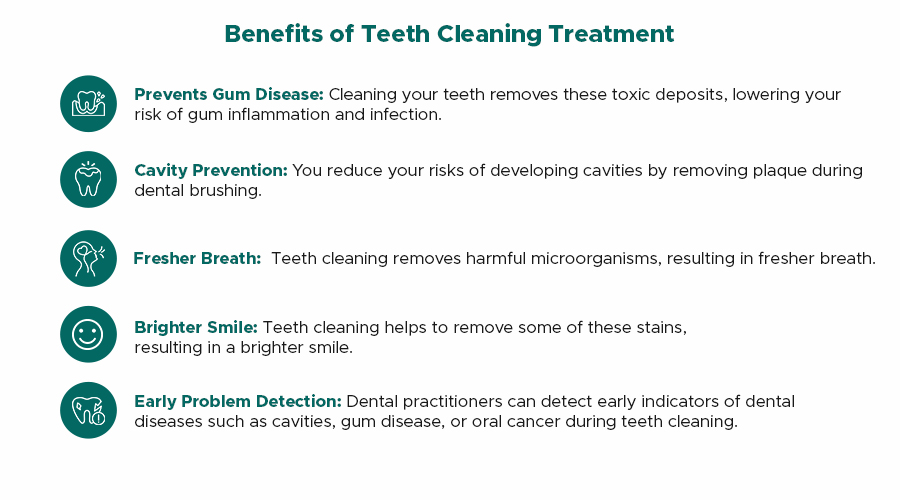Maintaining good oral hygiene is essential for a healthy smile and overall well-being. One of the key components of oral hygiene is teeth cleaning treatment.
In this blog, we will discuss the types, benefits, and possible side effects of teeth cleaning treatments, helping you understand the importance of this procedure for your dental health.
Types of Teeth Cleaning Treatment
There are Different Types of Teeth Cleaning Treatments, each Tailored to Various Needs. The Most Common Types Include:
1. Regular Dental Cleaning (Prophylaxis): The majority of people go through this routine teeth cleaning process. Dental hygienists use special tools to remove plaque and tartar build-up from your teeth. They also polish your teeth, leaving them smooth and gleaming.
2. Deep Cleaning (Scaling and Root Planing): Deep cleaning is required when tartar and germs have accumulated below the gumline. Scaling removes tartar from the surface and roots of the teeth, while root planing smoothes the root surfaces to avoid further build-up. This technique is usually performed with local anaesthesia.
3. Laser Teeth Cleaning: This advanced method removes plaque and tartar with laser technology. It is typically less painful than traditional scaling and may result in less bleeding and gum irritation.
Benefits of Teeth Cleaning Treatment
Undergoing regular teeth cleaning treatments offers numerous benefits that contribute to your oral health and overall well-being:

1. Prevents Gum Disease: The primary cause of gum disease is plaque and tartar build-up. Cleaning your teeth removes these toxic deposits, lowering your risk of gum inflammation and infection.
2. Cavity Prevention: Plaque accumulation can result in tooth decay. You reduce your risks of developing cavities by removing plaque during dental brushing.
3. Fresher Breath: Bacteria in the mouth significantly contribute to poor breath. Teeth cleaning removes harmful microorganisms, resulting in fresher breath.
4. Brighter Smile: Over time, coffee, tea, and certain foods can discolour your teeth. Teeth cleaning helps to remove some of these stains, resulting in a brighter smile.
5. Early Problem Detection: Dental practitioners can detect early indicators of dental diseases such as cavities, gum disease, or oral cancer during teeth cleaning. Treatments are more successful and less annoying when seen earlier.
Side Effects of Teeth Cleaning Treatment
While teeth cleaning treatments are generally safe, there are a few potential side effects to be aware of:
1. Sensitivity: Some people may experience increased tooth sensitivity to hot or cold temperatures after teeth cleaning. This usually subsides within a few days.
2. Gum Irritation: Gums might become slightly irritated or bleed a little after cleaning, especially if you have gum disease or sensitive gums. This is temporary and should improve quickly.
3. Discomfort: Deep cleaning procedures like scaling and root planing might cause some discomfort or mild pain, particularly if you have extensive tartar build-up. Over-the-counter pain relievers can help alleviate this.
4. Gum Recession: In rare cases, aggressive teeth cleaning or improper technique can lead to gum recession. It’s crucial to choose a skilled dental professional for your cleaning to minimise this risk.
Preparing for Teeth Cleaning Treatment
To make your teeth cleaning treatment as effective as possible, follow these simple steps:
1. Brush and Floss: Brush your teeth before your appointment to remove surface debris. Flossing helps reach areas between teeth that a toothbrush can’t.
2. Share Concerns: If you have specific oral health concerns or medical conditions, inform your dental hygienist before the treatment.
3. Ask Questions: If you’re unsure about any aspect of the procedure, don’t hesitate to ask questions. Understanding what’s happening can ease any anxiety.
In Conclusion
Teeth cleaning treatment is an essential part of maintaining good oral health. Regular cleanings can help you avoid gum disease, cavities, and other dental problems while also giving you a brighter smile and fresher breath. Remember that any negative impacts are usually temporary and outweighed by the benefits.
So, prioritise your oral health by scheduling regular teeth cleaning treatments with your trusted and best dental clinic in Faridabad, IVY League Dental. We have a team of the best dentist in Faridabad who can give the best teeth-cleaning treatment with utmost care and quality. Book an appointment now to know more.
FAQs
1. Is teeth cleaning treatment painful?
No, teeth cleaning treatment is generally not painful. You might feel some slight discomfort or sensitivity, especially if you have tartar build-up or sensitive gums. Your dentist may use local anaesthesia to ensure your comfort if deeper cleaning is needed.
2. How often should I get my teeth cleaned?
It’s recommended to have a professional teeth cleaning every six months. However, your dentist might suggest more frequent cleanings if you have gum disease or a history of dental issues. Regular cleanings help prevent problems and maintain good oral health.
3. Can teeth clean whiten my teeth?
Teeth cleaning can remove some surface stains and make your teeth appear brighter. However, if you’re looking for significant teeth whitening, you might consider professional teeth whitening treatments that specifically target deep stains.
4. Are there any risks associated with teeth cleaning?
Teeth cleaning treatments are generally safe. However, some temporary side effects might include increased sensitivity, slight gum irritation, or mild discomfort. These effects usually subside within a few days. To minimise risks, choose a qualified dental professional for your cleaning and inform them of any pre-existing oral conditions.
